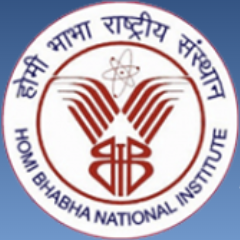Homi Bhabha National Institute (HBNI) is an Indian higher education institution focused on scientific research and technological development. It was established in 2005. It is named after Homi Jehangir Bhabha, the father of atomic energy in India, and is affiliated to the Department of Atomic Energy (DAE). HBNI is an umbrella organization that integrates multiple research institutes under DAE to provide graduate and postdoctoral education and conduct cutting-edge scientific research. Here are some key information about HBNI:
Historical background:
HBNI was established in 2005 to strengthen India's research capabilities in the field of nuclear energy and related scientific and technological fields.
It integrates multiple research institutes under DAE, including Bhabha Atomic Research Center (BARC), Nuclear Physics Laboratory (NPL), and some other specialized research institutes.
Academic reputation:
HBNI enjoys a high reputation in the fields of nuclear science, physics, chemistry, life sciences, materials science, engineering, etc.
It is one of the leading educational and research institutions in India in the field of nuclear energy and related sciences.
Academic Structure:
HBNI mainly provides graduate and postdoctoral education.
It offers the following degree programs through its affiliated research institutes:
Master of Science (M.Sc.) Program
Master of Engineering (M.Tech.) Program
Master of Philosophy (M.Phil.) Program
Doctor of Philosophy (Ph.D.) Program
These programs cover a variety of subject areas, including but not limited to:
Nuclear Physics
Radiochemistry
Biotechnology
Materials Science
Computer Science
Mechanical Engineering
Electrical Engineering
Nuclear Engineering
Research and Facilities:
HBNI and its affiliated institutes have advanced research facilities, including laboratories, accelerators, reactors, etc.
Research focuses on nuclear energy, renewable energy, materials science, biotechnology, nanotechnology and other fields.
The university encourages interdisciplinary research and maintains close cooperative relations with universities and research institutions at home and abroad.
Internationalization:
HBNI has established cooperative relations with several research institutions and universities internationally to promote international academic exchanges and joint research projects.
It also welcomes international students and scholars to come to study and research, and provides corresponding support services.
Campus Life:
HBNI and its affiliated institutions are located all over the country, and each research institute has its own campus, providing a good learning and living environment.
Students can participate in various academic and non-academic activities such as seminars, workshops, cultural festivals, etc.
Admission and Application:
Admission to HBNI usually requires a rigorous selection process, including academic performance review, entrance examination and interview.
For master's programs, students usually need to take a national entrance examination such as GATE (Graduate Admission Test).
For doctoral programs, applicants usually need to have a relevant master's degree and pass a research proposal and interview to determine admission qualifications.
Tuition:
As a public higher education institution, HBNI's tuition fees are relatively low, and many students can receive scholarships or grants.
Graduate Prospects:
HBNI graduates are very popular in the job market, especially in scientific research institutions, higher education institutions, government laboratories and high-tech industries.
Many graduates continue to engage in scientific research or hold senior positions in related fields.
Social Contribution:
HBNI contributes to the advancement of science and technology in India and the world through its education and research activities.
It also actively participates in scientific policy-making at the national level and plays an important role in energy security, environmental protection and other aspects.
-

Anna University
-

Shoolini University/Shoolini University of Biotechnology and Management Sciences
-

Jamia Millia Islamia
-

Manipal University/ Manipal Academy of Higher Education
-

VIT University/Vellore Institute of Technology
-

Savitribai Phule Pune University/University of Pune
-

Indian Institute of Science
-

Banaras Hindu University
-

Jawaharlal Nehru University
-

University of Delhi
-

Mesoamerican University
-

Istmo University
-

Mariano Galvez University of Guatemala
-

Regional University of Guatemala
-

Galileo University
-

Francisco Marroquín University
-

Rafael Landívar University
-

University of the Valley of Guatemala
-

University of San Carlos of Guatemala
-

Technological Institute of Tlaxcala Plateau
-

Golfo University
-

Technological University of South Sonora
-

Technological University of Huejotzingo
-

Tizimín Institute of Technology
-

Chilpancingo Institute of Technology

